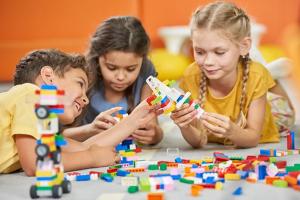
An article written for CRC by Early Years.
The Community Relations Council supports Early Years through its Core Funding Scheme.
Anti-Bullying Week 2023: Make A Noise About Bullying
Anti-Bullying Week 2023 is coordinated in England, Wales and Northern Ireland by the Anti-Bullying Alliance. This year it had the theme Make A Noise About Bullying and took place 13 – 17 November.
Read more about Anti-Bullying Week 2023
Media Initiative for Children
The Media Initiative for Children (MIFC) Respecting Difference Programme is an intervention programme using stories and resources, aimed at improving long term outcomes so that children, practitioners/teachers, parents, and communities become more aware of diversity and difference issues, and positively change attitudes and behaviours to those who are different.
This programme is currently core funded by the Community Relations Council.
This message focuses on bullying behaviours. Bullying is when people hurt someone on purpose. Children can be bullied for many reasons and bullying behaviours can happen anywhere. Children with obvious differences are not the only ones to suffer. Children have described bullying behaviours as being called names or teased, being hit, kicked or pushed, having money taken from them, being ignored or left out, etc.
Although bullying behaviour can be displayed by young children, practitioners/teachers should avoid labelling children as young as 3-5 years as “bullies.” It is more appropriate to think in terms of behaviours which are helpful or hurtful.
Bullying behaviour has four key aspects:
- It’s hurtful
- It’s intentional
- It’s repetitive
- It involves a power imbalance.
The definition of bullying is very important to understand when assessing the difference between “relational conflict” – where there is a “falling out” between individuals – and when it tips the balance to bullying.
Whether a child is being bullied or you just want to prevent it from happening, here's our anti-bullying tips for you.
- Challenging bullying behaviour in the early years gives you a great opportunity to “nip it in the bud.”
- Children need to be supported to speak out if they think someone isn’t being nice to them. They need to feel comfortable to come and tell you.
- Make sure you have an Anti-Bullying Policy and it’s up to date, freely accessible and regularly promoted. Share it with parents. Example of an anti-bullying policy statement.
- Do not label a child a “bully.” This is an unhelpful label and says that bullying is something you are, rather than a behaviour choice you can change. Instead, talk about bullying behaviour. Also provide support for the needs of the person displaying bullying behaviour as should be stated in policy.
Early years settings are well placed to provide a safe environment where parents, staff and children can learn about each other’s differences and similarities and learn to empathise and value each other and develop respect for those who are different.
Inclusive Practice ensures children can see themselves and their families in the environment. Sometimes the environment, both physical and emotional, speaks more loudly than the policies, so it is important to consider how the environment in the setting enables the children and their families to view diversity positively.
Children need to see representation of someone who “looks like me,” or “has a family structure like mine,” or “lives somewhere like where I live,” etc. Children absorb and develop ideas of what is possible for themselves from the images and materials around them, such as:
- Photographs of the children themselves (where acceptable to the families)
- Books, posters, small world play materials that depict and enable acting out a range of identities which actively challenge stereotypical representations and avoid tokenism
- Representation of different races, disabilities, ages, types of families including single parents, same-sex parents, grandparents raising children.
Traveller and Roma Communities
With Anti Bullying week in mind, it is only fitting that we take a moment and talk about the realities of this for children and young people within the Traveller and Roma communities. A recent report by the NHS Race and Health Observatory highlighted the inequalities faced by these communities within mental health care. The report outlined the findings of the Traveller Movement report where the negative attitudes often shown towards these communities was described as “the last acceptable form of racism.” This report outlined:
“These experiences were present across society: in education examples were provided of being made to feel inadequate; in health people spoke of being turned away by frontline health services and in criminal justice Gypsies and Travellers spoke of having their complaints dismissed by the police and legal professionals.” (Traveller Movement 2017, p. 9 as cited by NHS Race and Health Observatory, 2023)
Greenfields and Rogers (2020), discussed the hate crime experiences of these communities in a report chillingly entitled, Hate as Regular as Rain. During the research for this report, participants repeatedly highlighted that hate crimes and hate speech had a “persistent demoralising” effect on their lives. The data gathered stressed that being a victim of a hate crime has a greater impact on the emotional wellbeing than any other crimes that they faced.
The unfortunate reality is that 86% of children and young people within the traveller community admit that the biggest challenge for them within school, is bullying (Anti-bullying Alliance, 2020). For many, they feel that even though they are proud of their race and culture, they choose not to talk about it in school for fear that people will judge and treat them differently.
This message focuses on the inclusion of the Traveller Community and developing confidence and positive attitudes to self and others.